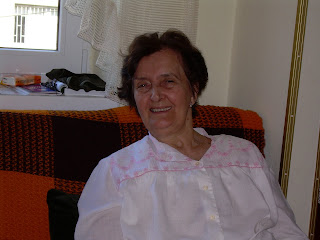Some people were able to escape from Sarajevo during the siege through the now famous Sarajevo tunnel that started under someone’s house, went under the airport and ended up outside of the city in the suburb of Dobrinja. It served as a lifeline to those who stayed in Sarajevo as people brought food, water and other necessities into the city. It collapsed after the war, but part of it is preserved as a museum now- it’s one of the places I definitely need to see while I am here. Anyway, some people stayed in Sarajevo because they could not escape. But a large percentage of the population stayed in Sarajevo during the four-year siege because they refused to be forced out of their city, which is so fascinating to me.
The city has this culture of passion for the arts, and particularly independent/experimental theatre, music, literature, etc. People of course stayed inside their homes a lot to protect themselves from the sniper fire coming from the hills. (Sarajevo is in this valley; the Miljacka River valley, with hills surrounding the city on the north and south sides. This is where Serb snipers positioned themselves.) And of course they had to leave at times to run outside for food, or as my host “Aunt” did, to bring in a girl wandering on the streets whose parents had been killed.
But a really fascinating and I guess awe-inspiring aspect of Sarajevans’ behavior during the siege was that some of them fundamentally refused to sacrifice their culture and love of the arts for an ugly imposed ethnic conflict. So many Sarajevans would risk sniper fire to run from their homes to certain theatres, music venues, etc. that still maintained performances in a spirit of resistance. I have a book with the names of a couple of these places, which are still around, but I don’t have it with me. When I visit the places, I will take some pictures and post them. So while running outside in the midst of sniper fire to see a play is something I think I would not do, who knows for sure? One of my friends here said to me, “what is the point of living if you have to be a prisoner in your home?” And while it seems like the kind of thing I would be inclined to try everything to prevent if a friend or family member did it, I have immense respect and like I said, awe, for people who were able to do that.
Despite all my theoretical and legal studies of genocide, I don’t think I understood what it is until I got here. (Not that I understand it now, but maybe a more accurate way to put it is that I have a better understanding.) Beyond the obvious acts of systematic murder and forced displacement, it entails the actual destruction of a culture, as a living thing. It is that type of destruction that Bosnians refused to allow by risking their lives to ensure their culture was not destroyed. In that sense, the act of one person running from her home, dodging bullets to reach an underground theatre with no running water or electricity, seems greater than the legally and politically powerful acts of international or national courts prosecuting accused perpetrators of mass murder, or even national police forces arresting the perpetrators of such acts. Because it’s an active form of direct opposition to the intent of the crime, with the goal of preservation, done peacefully and in the spirit of what the perpetrators were trying to destroy, not in the removed context of an institutional response to a crime.
Anyway, so something that I find to be kind of funny (which is probably offensive) is this belief in Bosnian culture that going outside with wet hair is lethal. That was something else I read that I didn’t quite believe until I got here, but it’s definitely true. Going outside with wet hair (it doesn’t matter what season it is) will cause all sorts of serious medical ailments, and can even kill you. I guess you are supposed to shower at night, dry your hair, and wait a few hours to make sure it is really dry, before going out. The first morning I left from work, Tetka Kimeta was pointing at her head, and pointing at my head (yes I had wet hair) and yelling. I had no idea what she was saying, and no one was at the apartment at that time who spoke English, so I just kept saying “Ja ne razumijem, oprostite” (I don’t understand, I’m sorry) and left. So my colleague Anisa told me later about the wet hair thing. She said that during the war, she was with several Bosnian journalists, and an American journalist, and they had to run outside during the siege. The American had wet hair, and one of the Bosnian journalists apparently freaked out and said, “Why are you going outside like that, you will die!” The American colleague responded that they were all risking their lives by running through sniper fire, and the Bosnian colleague said something along the lines of “Well yes, you can avoid sniper fire, but wet hair will kill you!” So the other morning, I left with wet hair again, and an English-speaking friend was there, and Tetka Kimeta started yelling again. The friend said, “She wants you to dry your hair, she doesn’t want you to die.” I responded that I would be fine, but I told Anisa about it when I got to work, and she said, “Oh, the poor woman will be worrying all day, she will think you are dead!” Oops.
Sorry there weren't photos in this one. Here is Tetka Kimeta (when I am not giving her heart attacks with my wet hair.)

No comments:
Post a Comment